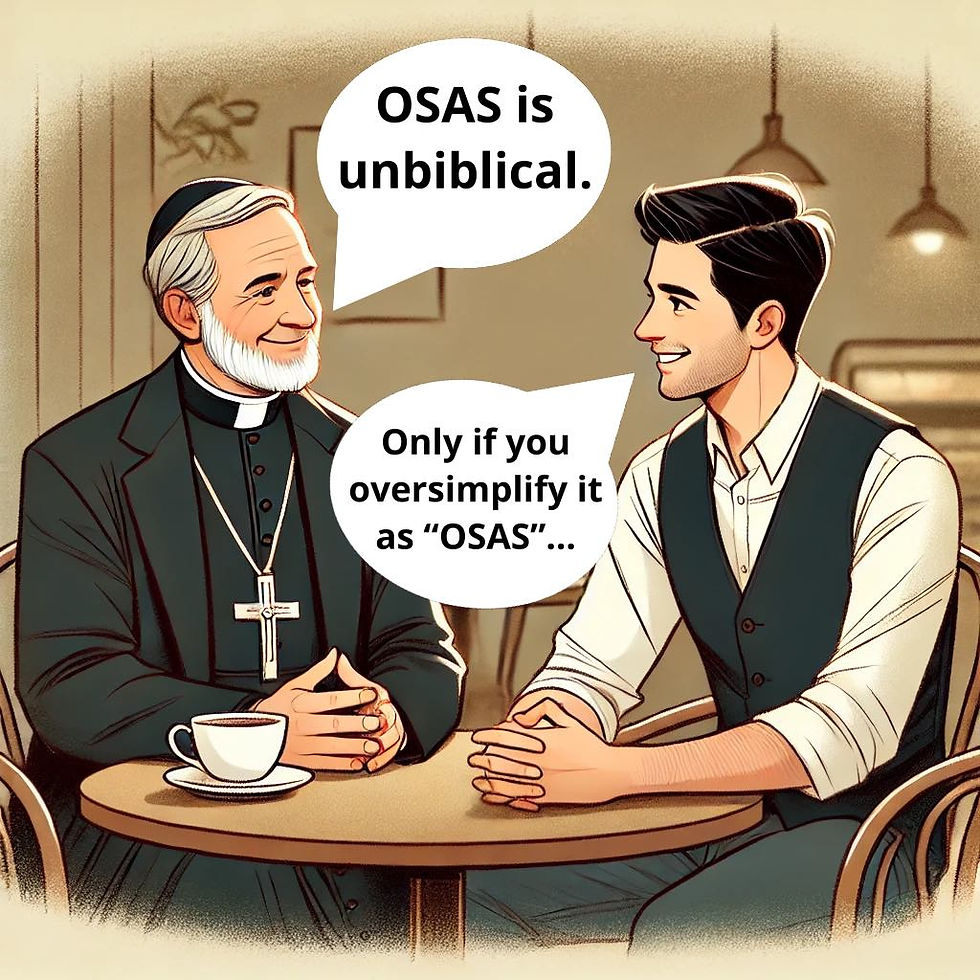James 2:10 refutes Conditional Security
- Bible Brian

- Mar 2, 2022
- 4 min read
Updated: Aug 1, 2023

Works-based "gospels" and conditional security (which, let's be honest, is just another works-based "gospel") both suffer the serious flaw of being ambiguous. So ambiguous, in fact, that while the Bible says you can know you have eternal life (e.g. 1 John 5:13), it would actually be impossible to know whether or not you have "crossed the line", whether through some sin, or through neglecting Holiness.
But James 2:10 is one of many verses that effectively tells us that if salvation was by works, no one could be saved, and if you could lose your salvation, you would.
A question to ask people who believe in a works based "gospel" or conditional security is where is the line between the saved and the unsaved? The Biblical answer is that Jesus is the line. "Jesus saves", while being a tired cliché, is also a factual statement about how salvation is not based on anything we do or don't do, but on our faith in what He has done on our behalf. Jesus is perfectly Holy, never sinning even once in His life, and through His death and resurrection, we are not only forgiven for our sins, but are rewarded for our good deeds. The only thing that separates a Christian from an unbeliever is our faith.
But for anyone who believes salvation can be gained or lost through works or lack thereof, the answer is up in the air. "We don't know where the line is, we just don't want to cross it." Such philosophy trivialises sin. Biblically speaking, all sin is alike. The difference between what we consider "small" sins, such as white lies, and "big" sins, such as murder, is not the severity of the sin, but the severity of its effect. If you tell a single white lie, James says you're no better than a murderer, because if you offend in just one point in the law, you're guilty with regard to all of it. So here's my question: Have you lied? If you look at someone with lust, Jesus says that's adultery (Matthew 5:28). Have you lusted after someone other than your spouse recently? (Note that this applies even if you're not married). John tells us that if you hate your brother, you are a murderer, and no murderer has eternal life (1 John 3:15).
So, if there was a line that you could possibly cross to lose your salvation, you have already crossed it. You cross it many times a day. With God, even the "little" sins are enough that the cross is the only way you could have been saved. If there was an easier way, God would have done it (Luke 22:42). So, maybe you're not a murderer, rapist, or paedophile. Maybe you're not a porn addict, a crack head, or an alcoholic. Maybe you're not a drug dealer, a bank robber, or a pimp. All these sins, I think we can all agree, are terrible. But if you've so much as intentionally accepted a penny more change than you are owed at a corner shop, you are no more worthy of Heaven than anyone who has committed one of the sins listed above, or one of the "big" sins not listed above.
So perhaps you're panicking right now. If you believe in conditional security, maybe you're quaking in your boots. And this is why I put works based "gospel" in air quotes. "You can earn your way to Heaven" is no good news, because it comes with the caveat of "you can also lose your ticket". But the really good news is that while you can't earn Heaven, it has been bought for you. You've broken the law, sure. You broke the law. But Jesus didn't, and if you put your faith in Him, God credits all of your sins to Jesus. Not just the "little" ones, but the "big" ones too.
But here's where the accusations of lawlessness start to crop up. If you don't believe you can lose your salvation, why be good, right? The problem is, this focuses only on one aspect of the Gospel. One could compare it to focusing on Jesus' death while ignoring His resurrection, then claiming that the Gospel is pointless because Jesus is just another religious nut who died. Just as there is more to the Gospel than Jesus' death, so also is there more to it than its sufficiency. We may not be saved by our works, but we are saved to good works. There's no point in getting saved if the result of that is you're going to live as if you're not. It would be like jumping in the mud immediately after taking a shower. If the only reason you're doing good is to get saved, you've missed the point. If that's not the only reason you're doing good, you already understand the flaw in that argument.
If you believe you can earn salvation, I've got bad news: You can't. If you believe you can lose your salvation, I've got good news: You can't. If you have faith in Christ, your salvation has been earned for you, and it cannot be lost. The result of this salvation is that you will continue to throw off the old, sinful nature you once had, and will continue to grow in Holiness. Eternal security is not a lawless doctrine, but a Holy one.






Comments